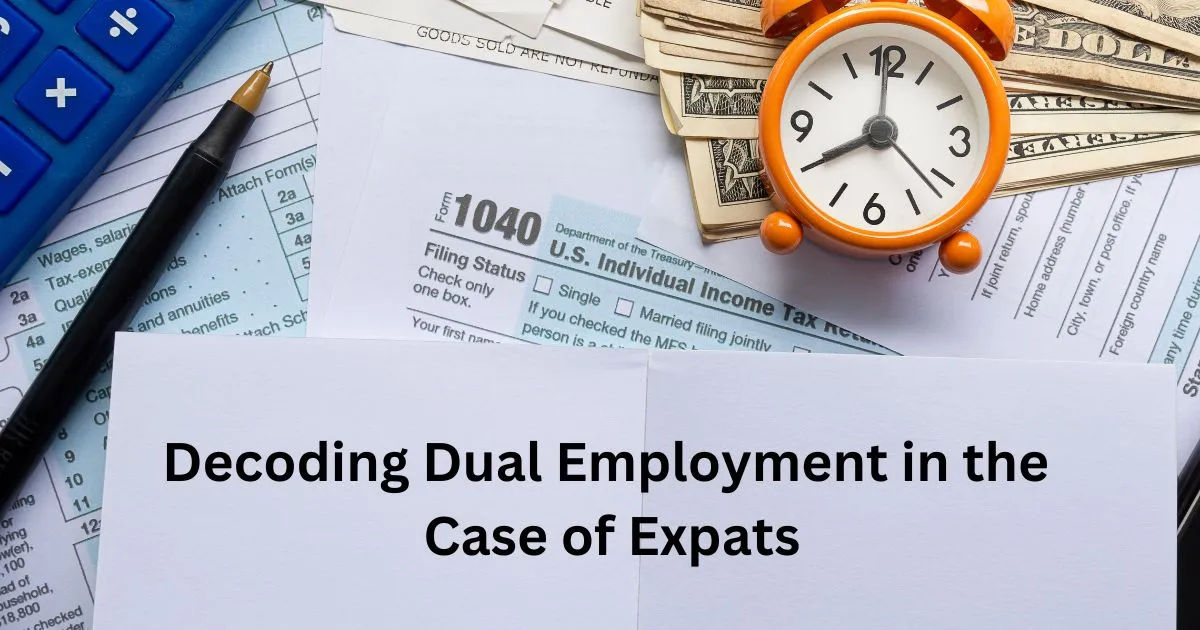


Secondment or deputation of expats is not an uncommon arrangement. However, things get complicated when the secondment is in another country. Multiple laws, taxation and agreements – various factors come into play in case of secondment of expats into another country. One of the key aspects is dual employment cases. Dual employment for expats can offer several advantages, such as higher income and increased career opportunities. However, it can also lead to legal and financial complications, which must be navigated carefully. How does dual employment situation in case of expats arise? What is the treatment for the same? Let’s decode dual employment in the case of expats.
Expats are primarily the employees of the foreign entity. However, for the period of their secondment in India, they might enter into an employment contract with the Indian entity as well. The important thing to note here is that their employment contract with the foreign entity is still in force while they enter another employment contract in India. This gives rise to dual employment for expats.
Whenever the instance of dual employment of expats arises, the following is the mechanism you will find in the picture:
Here are some of the key aspects of dual employment of expats in India:
1) Employer
As per this arrangement, the employee is on dual employment. Both the Indian entity as well as the foreign entity shall be regarded as the employer of the seconded employee. Therefore, the provisions of the agreement between both entities assume importance in this regard. The agreement will be a dominant factor in deciding the taxation of expat employees as well as the applicability of GST. Thus, legal guidance is of utmost importance in this regard.
2) Compliances
As both the Indian entity as well as the foreign entity are regarded as the employers of the seconded employees, therefore, both entities are liable to ensure complete compliance with the laws of their lands relating to the seconded employees. This includes disclosure requirements, employment laws, taxation laws, social security benefits etc.
3) Taxation
The taxation in the home country of the employee will depend upon the tax laws of such country. However, in the case of taxation in India, the seconded employees will be liable to pay tax in India if they fulfil the conditions as laid down in the Income Tax Act, 1961 in relation to the residential status, provisions under the head ‘Salaries’ and other applicable provisions. Further, the taxation will be influenced by the provisions of the Double Taxation Avoidance Agreement (DTAA), if any, entered into between India and the home country of the seconded employees. DTAAs are complex agreements and it might create difficulties for expats to implement its provisions.
4) Ancillary Benefits
Apart from certain complications, there are multiple benefits of dual employment of expats as well. Expats must consider the income they can earn from each job and how it compares to the cost of living in both their home country and the country where they are working. It might be possible that the cost of living is less in the country where they are seconded. Further, holding a job in their home country can provide expats with access to career opportunities and professional development that may not be available in the country where they are working.
Whenever the employees are seconded to another country, it is important to determine the legal position of this arrangement and the terms of the contract or agreement between the foreign entity and the Indian entity. Further, expat taxation in India and the foreign country also plays an important role as it directly impacts the earnings of the seconded employees.
Tax planning becomes a crucial aspect in such cases. Most expats aren’t aware of the tax laws of both nations and therefore, might end up paying dual taxes. DTAAs are complicated agreements and understanding the taxability through such agreements may become a daunting task. Most expats prefer hiring tax professionals to avoid any dual taxability of their income. Further, companies entering into such arrangements also undertake legal guidance to ensure that they do not invite any unwanted legal complications. In case you need any assistance in relation to dual employment of expats, contractual and legal implications and expat taxation in India, feel free to contact the ASC Group.
Also Read - Brief on Expatriate Taxation in India: Expat’s Salary and their Taxability
























































Leave a Reply
Your email address will not be published. Required fields are marked *